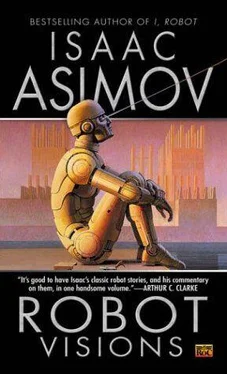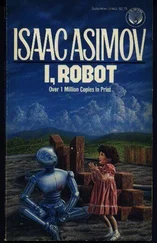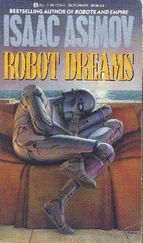Isaac Asimov - Robot Visions
Здесь есть возможность читать онлайн «Isaac Asimov - Robot Visions» весь текст электронной книги совершенно бесплатно (целиком полную версию без сокращений). В некоторых случаях можно слушать аудио, скачать через торрент в формате fb2 и присутствует краткое содержание. Жанр: Фантастика и фэнтези, на английском языке. Описание произведения, (предисловие) а так же отзывы посетителей доступны на портале библиотеки ЛибКат.
- Название:Robot Visions
- Автор:
- Жанр:
- Год:неизвестен
- ISBN:нет данных
- Рейтинг книги:5 / 5. Голосов: 1
-
Избранное:Добавить в избранное
- Отзывы:
-
Ваша оценка:
- 100
- 1
- 2
- 3
- 4
- 5
Robot Visions: краткое содержание, описание и аннотация
Предлагаем к чтению аннотацию, описание, краткое содержание или предисловие (зависит от того, что написал сам автор книги «Robot Visions»). Если вы не нашли необходимую информацию о книге — напишите в комментариях, мы постараемся отыскать её.
Robot Visions — читать онлайн бесплатно полную книгу (весь текст) целиком
Ниже представлен текст книги, разбитый по страницам. Система сохранения места последней прочитанной страницы, позволяет с удобством читать онлайн бесплатно книгу «Robot Visions», без необходимости каждый раз заново искать на чём Вы остановились. Поставьте закладку, и сможете в любой момент перейти на страницу, на которой закончили чтение.
Интервал:
Закладка:
“What are you talking about?” said Smythe-Robertson.
“My client, Andrew Martin- he has just become my client- is a free robot who is entitled to ask U.S. Robots and Mechanical Men Corporation for the rights of replacement, which the corporation supplies to anyone who owns a robot for more than twenty-five years. In fact, the corporation insists on such replacement.”
Paul was smiling and thoroughly at ease. “The positronic brain of my client,” he went on, “is the owner of the body of my client which is certainly more than twenty-five years old. The positronic brain demands the replacement of the body and offers to pay any reasonable fee for an android body as that replacement. If you refuse the request, my client undergoes humiliation and we will sue.
“While public opinion would not ordinarily support the claim of a robot in such a case, may I remind you that U.S. Robots is not popular with the public generally. Even those who most use and profit from robots are suspicious of the corporation. This may be a hangover from the days when robots were widely feared. It may be resentment against the power and wealth of U.S. Robots, which has a worldwide monopoly. Whatever the cause may be, the resentment eats. I think you will find that you would prefer not to be faced with a lawsuit, particularly since my client is wealthy and will live for many more centuries and will have no reason to refrain from fighting the battle forever.”
Smythe-Robertson had slowly reddened. “You are trying to force-”
“I force you to do nothing,” said Paul. “If you wish to refuse to accede to my client’s reasonable request, you may by all means do so and we will leave without another word. But we will sue, as is certainly our right, and you will find that you will eventually lose.”
“Well.”
“I see that you are going to accede,” said Paul. “You may hesitate but you will come to it in the end. Let me assure you, then, of one further point: If, in the process of transferring my client’s positronic brain from his present body to an organic one, there is any damage, however slight, then I will never rest until I’ve nailed the corporation to the ground. I will, if necessary, take every possible step to mobilize public opinion against the corporation if one brain path of my client’s platinum-iridium essence is scrambled.” He turned to Andrew and asked, “Do you agree to all this, Andrew?”
Andrew hesitated a full minute. It amounted to the approval of lying, of blackmail, of the badgering and humiliation of a human being. But not physical harm, he told himself, not physical harm.
He managed at last to come out with a rather faint “Yes.”
He felt as though he were being constructed again. For days, then for weeks, finally for months, Andrew found himself not himself somehow, and the simplest actions kept giving rise to hesitation.
Paul was frantic. “They’ve damaged you, Andrew. We’ll have to institute suit!”
Andrew spoke very slowly. “You- mustn’t. You’ll never be able to prove- something- like m-m-m-m- ”
“Malice?”
“Malice. Besides, I grow- stronger, better. It’s the tr- tr- tr- ”
“Tremble?”
“Trauma. After all, there’s never been such an op-op-op- before.”
Andrew could feel his brain from the inside. No one else could. He knew he was well, and during the months that it took him to learn full coordination and full positronic interplay he spent hours before the mirror.
Not quite human! The face was stiff- too stiff and the motions were too deliberate. They lacked the careless, free flow of the human being, but perhaps that might come with time. At least now he could wear clothes without the ridiculous anomaly of a metal face going along with it.
Eventually, he said, “I will be going back to work.”
Paul laughed. “That means you are well. What will you be doing? Another book?”
“No,” said Andrew, seriously. “I live too long for any one career to seize me by the throat and never let me go. There was a time when I was primarily an artist, and I can still turn to that. And there was a time when I was a historian, and I can still turn to that. But now I wish to be a robobiologist.”
“A robopsychologist, you mean.”
“No. That would imply the study of positronic brains, and at the moment I lack the desire to do that. A robobiologist, it seems to me, would be concerned with the working of the body attached to that brain.”
“Wouldn’t that be a roboticist?”
“A roboticist works with a metal body. I would be studying an organic humanoid body, of which I have the only one, as far as I know.”
“You narrow your field,” said Paul, thoughtfully. “As an artist, all conception is yours; as a historian you deal chiefly with robots; as a robobiologist, you will deal with yourself.”
Andrew nodded. “It would seem so.”
Andrew had to start from the very beginning, for he knew nothing of ordinary biology and almost nothing of science. He became a familiar sight in the libraries, where he sat at the electronic indices for hours at a time, looking perfectly normal in clothes. Those few who knew he was a robot in no way interfered with him.
He built a laboratory in a room which he added to his house; and his library grew, too.
Years passed, and Paul came to him one day and said, “It’s a pity you’re no longer working on the history of robots. I understand U.S. Robots is adopting a radically new policy.”
Paul had aged, and his deteriorating eyes had been replaced with photoptic cells. In that respect, he had drawn closer to Andrew.
“What have they done?” Andrew asked.
“They are manufacturing central computers, gigantic positronic brains, really, which communicate with anywhere from a dozen to a thousand robots by microwave. The robots themselves have no brains at all. They are the limbs of the gigantic brain, and the two are physically separate.”
“Is that more efficient?”
“U.S. Robots claims it is. Smythe-Robertson established the new direction before he died, however, and it’s my notion that it’s a backlash at you. U.S. Robots is determined that they will make no robots that will give them the type of trouble you have, and for that reason they separate brain and body. The brain will have no body to wish changed; the body will have no brain to wish anything.
“It’s amazing, Andrew,” Paul went on, “the influence you have had on the history of. robots. It was your artistry that encouraged U.S. Robots to make robots more precise and specialized; it was your freedom that resulted in the establishment of the principle of robotic rights; it was your insistence on an android body that made U.S. Robots switch to brain-body separation”
Andrew grew thoughtful. “I suppose in the end the corporation will produce one vast brain controlling several billion robotic bodies. All the eggs will be in one basket. Dangerous. Not proper at all.”
“I think you’re right,” said Paul, “but I don’t suspect it will come to pass for a century at least and I won’t live to see it. In fact, I may not live to see next year.”
“Paul!” cried Andrew, in concern.
Paul shrugged. “Men are mortal, Andrew. We’re not like you. It doesn’t matter too much, but it does make it important to assure you on one point. I’m the last of the human Martins. The money I control personally will be left to the trust in your name, and as far as anyone can foresee the future, you will be economically secure.”
“Unnecessary,” Andrew said, with difficulty. In all this time, he could not get used to the deaths of the Martins.
“Let’s not argue. That’s the way it’s going to be. Now, what are you working on?”
Читать дальшеИнтервал:
Закладка:
Похожие книги на «Robot Visions»
Представляем Вашему вниманию похожие книги на «Robot Visions» списком для выбора. Мы отобрали схожую по названию и смыслу литературу в надежде предоставить читателям больше вариантов отыскать новые, интересные, ещё непрочитанные произведения.
Обсуждение, отзывы о книге «Robot Visions» и просто собственные мнения читателей. Оставьте ваши комментарии, напишите, что Вы думаете о произведении, его смысле или главных героях. Укажите что конкретно понравилось, а что нет, и почему Вы так считаете.








